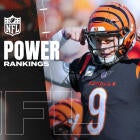The Cowboys started negotiating a long-term deal with Creative Artist Agency Football's Todd France, Dak Prescott's agent, over a year ago, when he was heading into the final year of his four-year rookie contract. Because the parties couldn't get on the same page contractually, Prescott was given an exclusive franchise tag in March worth $31.409 million to make sure the Cowboys retained the quarterback's services for the 2020 season. The Cowboys have no intention of going to the rare and extreme step of letting Prescott become an unrestricted free agent by rescinding his franchise tag.
The latest Cowboys offer reportedly on the table averages $35 million per year for five years with guarantees in the $106 million range, according to 105.3 The Fan's Mike Fisher. $35 million per year would tie Seahawks quarterback Russell Wilson as the NFL's highest-paid player. $106 million in guarantees would be the fourth most in an NFL contract. Fisher didn't reveal other pertinent details about the Dallas offer, such as signing bonus, amount fully guaranteed at signing and cash flow.
Negotiations will come to a head before 4 p.m. ET on July 15, as that's the deadline for franchise players to sign a multi-year contract. After this deadline, the Cowboys are prohibited from signing Prescott long-term until the end of the 2020 regular season on Jan. 3, 2021.
Why Prescott doesn't want five years
One major sticking point in the negotiations is length of contract as Prescott wants a four-year deal. If representing Prescott, I wouldn't want a five-year deal either. The salary cap is expected to increase significantly with the addition of a 17th regular season game and new media rights deals, and most of the current TV deals expire after the 2022 season. The 17th game most likely will be implemented at some point before the 2023 season. Prescott would be better positioned to take advantage of the anticipated financial growth with a four-year deal.
The recent trend with high-end quarterback contracts has been a shorter term than what Dallas would prefer. There are seven passers with contracts averaging $30 million or more per year. Falcons quarterback Matt Ryan is the only one whose deal contains more than four new contract years as he signed a five-year contract extension. The average length for these seven quarterback deals is 3.57 new years. Since all seven deals were extensions (had at least one year remaining on their existing deals when signed), the quarterbacks are under contract for average of five total years.
Total and average salary
There wouldn't be many circumstances where a five-year deal would get real consideration from Prescott's agent. First off, I would be operating under the assumption that Prescott would get a second franchise tag in 2021 at the CBA-mandated 20 percent increase, so his salary next year would be $37,690,800. Prescott would make nearly $69.1 million through 2021 by going year-to-year with unrestricted free agency as a realistic possibility in 2022, since a third franchise tag would be $54,274,752, a 44 percent increase over the 2021 franchise tag.
The question essentially becomes what type of three-year deal (covering the 2022 through 2024 seasons) can Dallas offer two years early in an enticing enough five-year structure to abandon the quest for a four-year deal or forego making almost $69.1 million by playing the franchise tag game before likely hitting the open market.
The $40 million-per-year quarterback is on the horizon. The Texans have had preliminary discussions regarding a new deal with 2017 first-round pick Deshaun Watson, who is under contract through the 2021 season. After the Texans dramatically reset the offensive tackle market with Laremy Tunsil at $22 million per year on a shorter-than-expected deal (a three-year extension), it wouldn't be too surprising for Watson's extension to hit the $40 million-per-year mark.
The Chiefs are reportedly making 2018 NFL MVP Patrick Mahomes' extension a priority now that the NFL Draft has been conducted. If Watson doesn't become the NFL's first $40 million-per-year player, Mahomes should when he signs a new contract unless he intentionally leaves a lot of money on table in giving the Chiefs a massive hometown discount. 2019 NFL MVP Lamar Jackson becomes eligible for a new deal once the 2020 regular season is completed.
Knowing that quarterback salaries are going to surpass the $40 million-per-year mark no later than next year, valuing Prescott's 2022 to 2024 contract years in the $120 million neighborhood isn't outlandish. Those years added to the nearly $70 million from franchise tags in this year and next year puts the five-year contract total at $190 million for an average of $38 million per year.
Cash flow
The cash flow in the early years of a five-year contract would have to be superior to what Dallas did with its last two franchise players, defensive end DeMarcus Lawrence and wide receiver Dez Bryant.
Last offseason, Lawrence signed a five-year, $105 million contract with $65 million in guarantees, of which $48 million was fully guaranteed at signing. $25 million of the guaranteed money was a signing bonus and another $4.6 million was in a roster bonus due six days after signing, bringing the total upfront money to $29.6 million.
Bryant signed a five-year, $70 million contract in 2015 as the deadline for franchise players to sign long-term deals was approaching. $32 million was fully guaranteed at signing, which included a $20 million signing bonus. The total guarantees were $45 million.
The money earned after each year by Bryant and Lawrence:
| Player | Year 1 | Year 2 | Year 3 | Year 4 | Year 5 |
|---|---|---|---|---|---|
| Dez Bryant | 32.86% | 45.71% | 64.29% | 82.14% | 100% |
| DeMarcus Lawrence | 29.62% | 45.71% | 61.90% | 80.00% | 100% |
| Average | 30.91% | 45.71% | 62.86% | 80.86% | 100% |
Prescott's cash flow would have to be comparable to the three quarterbacks (Derek Carr, Matt Ryan and Matthew Stafford) who have signed five-year extensions averaging at least $25 million per year since 2017 to get my attention.
The percentage of new money earned after each of the new contract years in their respective deals:
| Player | Year 1 | Year 2 | Year 3 | Year 4 | Year 5 |
|---|---|---|---|---|---|
| Derek Carr | 37.21% | 53.21% | 68.40% | 84.10% | 100% |
| Matt Ryan | 36.50% | 50.17% | 65.50% | 81.33% | 100% |
| Matthew Stafford | 37.78% | 52.22% | 68.15% | 82.96% | 100% |
| Average | 37.12% | 51.78% | 67.26% | 82.71% | 100% |
Contract guarantees
Two important data points to top in this category include Rams quarterback Jared Goff's record of $110,042,682 in overall guarantees and Ryan's NFL-leading $94.5 million fully guaranteed at signing.
The Cowboys fully guaranteed the first two years of Lawrence and Bryant's contracts, while the third year was guaranteed for injury at signing and became fully guaranteed a couple days after free agency started in the second contract year. For Lawrence, his 2021 contract year was fully guaranteed this past March. The Cowboys shouldn't reasonably expect Prescott to sign a contract where the same or better isn't done for him.
Prescott's full guarantee would need to be in excess of $95 million with cash flow percentages similar to Carr, Ryan and Stafford's deals in a $190 million contract. The overall guarantees would have to exceed $125 million since Prescott's cash through three years (2022) would be 65.79 percent at that amount.
Prescott's 2020 compensation would have to be right around $70 million to match the first-year cash percentages of those three quarterbacks. It really wouldn't matter how Dallas classified the first-year cash (i.e., signing bonus, base salary, roster bonus due shortly after signing). In order to get any significant break on Prescott's 2020 salary cap number relative to his $31.409 million franchise number, his signing bonus would probably be at least $55 million. 28.57 percent of Bryant's deal was in signing bonus; on a $190 million contract, a $55 million signing bonus would be a comparable amount for Prescott.
There wouldn't be guarantees in the final two contract years. A portion of Prescott's 2023 and 2024 compensation would need to be in first or third day of the league year roster bonuses so Dallas couldn't release Prescott at an inopportune time like they did with Bryant in 2018. Goff (second day of league year), Carson Wentz (third day) and Wilson (fifth day) have $5 million roster bonuses in the final two years of their respective deals. If the Cowboys were to release Prescott, they would have to do so at the beginning of free agency when other teams still had plenty of salary cap room.
Performance bonuses
The high-end four-year extensions signed by quarterbacks over the last couple of years have performance bonuses. Aaron Rodgers' extension with the Packers is worth a maximum of $138 million through salary escalators and incentives. The maximum value of Wilson's deal is $146 million because of salary escalators. Wentz's contract with the Eagles is worth up to $144 million through salary escalators. Goff can make as much as $148 million under his extension thanks to his incentives and salary escalators.
The performance bonuses for those contracts are as follows: Rodgers at $4 million, Wilson at $6 million, Wentz at $12 million and Goff at $14 million. $10 million of salary escalators and/or incentives in 2023 and 2024, Prescott's last two contract years in a potential extension, to bring the maximum value of the contract to $200 million would be a necessity. Any salary escalators would have to increase the March roster bonuses rather than the base salaries. Triggering an escalator doesn't necessarily mean that the player will make the additional money, and the escalated amount is rarely guaranteed so a team can still release a player without incurring the financial obligation.
Other contract components
There would have to some other component to the contract to make a five-year term more appealing. This could be accomplished with the inclusion of a clause prohibiting the Cowboys from designating Prescott as a franchise or transition player when his contract was up after the 2024 season. The clause would prevent the long, protracted negotiation that has been occurring between the Cowboys and France, as the Cowboys would be forced to put their best foot forward at an earlier time without the use of a franchise or transition tag when Prescott's contract expired.
It would not be an unprecedented clause for a quarterback. The fully guaranteed three-year contract Kirk Cousins signed with the Vikings in 2018 free agency put limitations on how he could be restricted from entering the open market in 2021 had he not signed an extension this past March. Drew Brees' most recent contracts with the Saints have had a clause prohibiting the use of franchise or transition designation. When Tom Brady reworked his contract with the Patriots last August, a prohibition clause just like Brees' was included.
An alternative would be some sort of mechanism where Prescott could void his 2024 contract year. Extraordinary individual achievement and/or team success, such being selected league MVP or Dallas winning the Super Bowl where Prescott is named the game's MVP, would be a requirement at some time during the first four contract years. Dallas would retain the ability to use a franchise or transition tag on Prescott with voiding of the 2024 contract year.
Final thoughts
I wouldn't expect Dallas to be receptive to giving Prescott a five-year deal at $38 million per year containing upwards to $130 million in guarantees where close to $100 million is fully guaranteed at signing with a way from him to get out a year early. I found during my numerous years as an agent that giving a team two different contract options simultaneously in a difficult negotiation where one choice was designed to be unpalatable could be helpful in getting the discussion to focus more on the desired deal. That would be a motivation for raising this type of five-year deal to the Cowboys. There would be more flexibility on the most important aspects of the contract with a four-year term. A voiding mechanism and a prohibition clause wouldn't be considerations with a four-year deal.
It would be interesting to see whether Prescott would actually start playing the franchise tag game if Dallas was still insisting on a five-year deal as the July 15 deadline neared without much improvement to the current reported offer. Prescott would have to successfully incur the risk of injury and poor performance again to potentially gain additional leverage with the Cowboys next offseason. It should be much easier for Prescott to bet on himself while making $31.409 million than it was last season when he had only made a little over $2 million from his rookie contract during his first three NFL seasons and had a $2.025 million salary.
A second franchise tag next year at just under $37.7 million could be too cost prohibitive because the 2021 salary cap might be below the current $198.2 million level if the coronavirus pandemic leads to games being played in empty stadiums where league revenues are decreased. Free agency for Prescott in 2021 could be a double-edged sword under this scenario, because a lot of teams would probably be lacking salary cap space.





















